1020GCH Essay: Self-Regulated Learning & Critical Thinking in Nursing
VerifiedAdded on 2022/09/02
|7
|1739
|19
Essay
AI Summary
This essay delves into the crucial role of Self-Regulated Learning (SRL) in developing and strengthening critical analytical and reflective thinking skills among student nurses, essential for lifelong professional development in dynamic nursing contexts. The essay explores how SRL, encompassing cognitive and metacognitive processes, supports the acquisition of these vital skills. It emphasizes the interplay between critical thinking (cognition) and reflective thinking (metacognition), highlighting that effective clinical reasoning requires the integration of both. The discussion covers the SRL model, outlining how metacognitive skills like self-regulation, self-control, and self-evaluation influence critical thinking and diagnostic reasoning. The essay references research and studies that showcase the importance of these skills, their impact on nursing education, and their application in solving complex clinical problems. It also discusses the influence of environmental factors and social interactions on SRL. In conclusion, the essay argues that the development of both cognitive and metacognitive skills is fundamental for nurses to achieve professional competence, make sound clinical judgments, and handle ambiguity effectively, ultimately supporting the utilization of self-regulated learning to develop both critical reflective and critical analytical thinking.
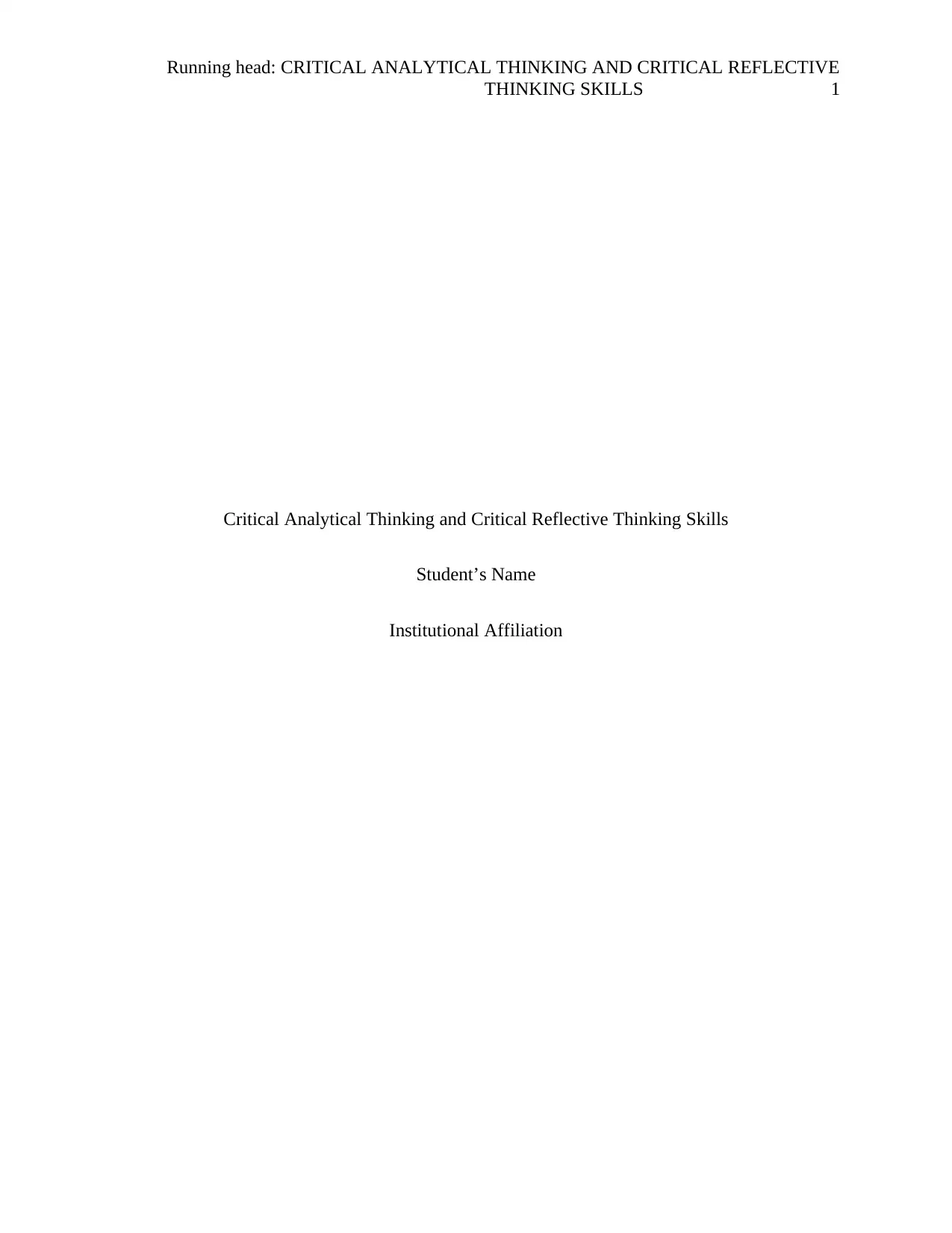
Running head: CRITICAL ANALYTICAL THINKING AND CRITICAL REFLECTIVE
THINKING SKILLS 1
Critical Analytical Thinking and Critical Reflective Thinking Skills
Student’s Name
Institutional Affiliation
THINKING SKILLS 1
Critical Analytical Thinking and Critical Reflective Thinking Skills
Student’s Name
Institutional Affiliation
Paraphrase This Document
Need a fresh take? Get an instant paraphrase of this document with our AI Paraphraser
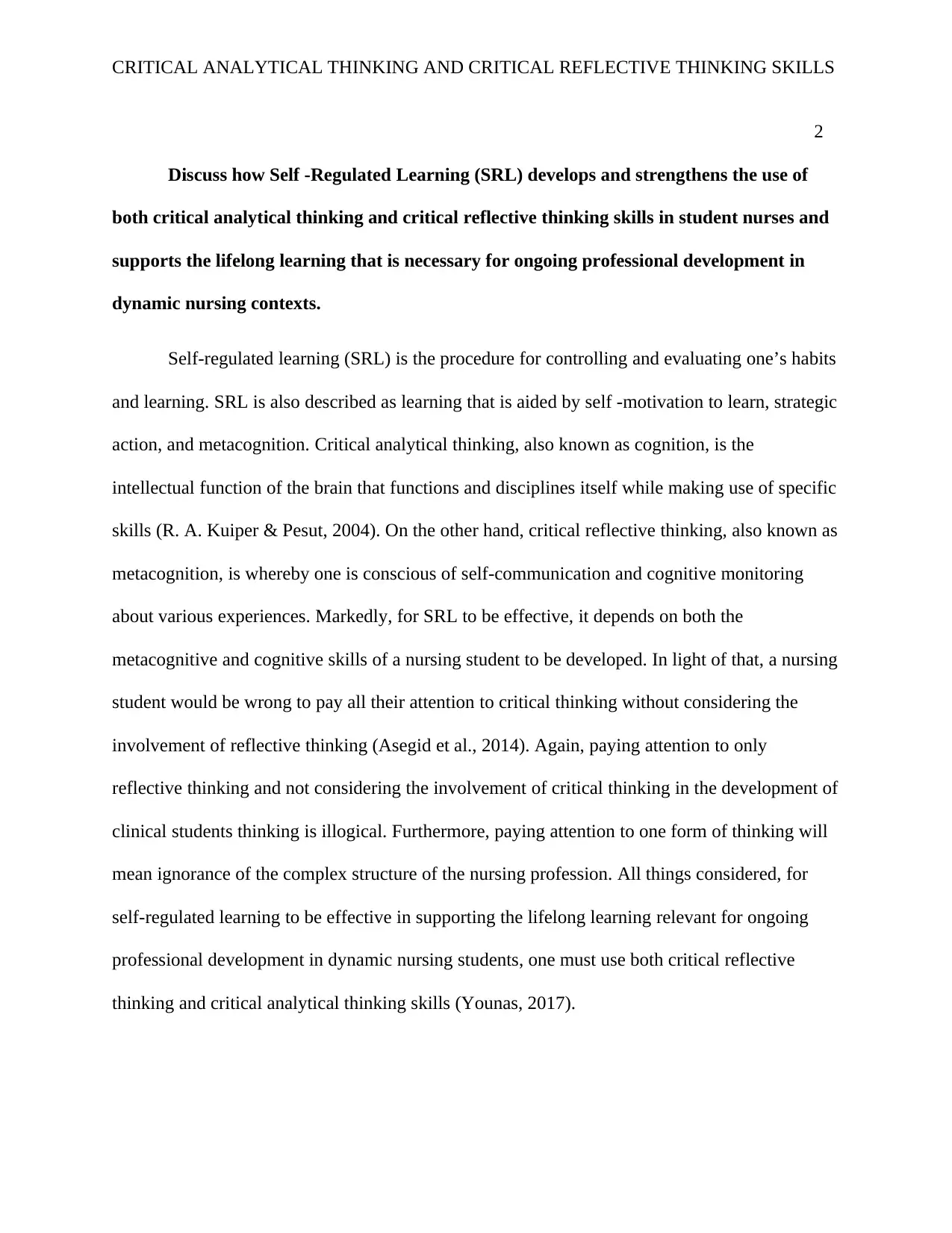
CRITICAL ANALYTICAL THINKING AND CRITICAL REFLECTIVE THINKING SKILLS
2
Discuss how Self -Regulated Learning (SRL) develops and strengthens the use of
both critical analytical thinking and critical reflective thinking skills in student nurses and
supports the lifelong learning that is necessary for ongoing professional development in
dynamic nursing contexts.
Self-regulated learning (SRL) is the procedure for controlling and evaluating one’s habits
and learning. SRL is also described as learning that is aided by self -motivation to learn, strategic
action, and metacognition. Critical analytical thinking, also known as cognition, is the
intellectual function of the brain that functions and disciplines itself while making use of specific
skills (R. A. Kuiper & Pesut, 2004). On the other hand, critical reflective thinking, also known as
metacognition, is whereby one is conscious of self-communication and cognitive monitoring
about various experiences. Markedly, for SRL to be effective, it depends on both the
metacognitive and cognitive skills of a nursing student to be developed. In light of that, a nursing
student would be wrong to pay all their attention to critical thinking without considering the
involvement of reflective thinking (Asegid et al., 2014). Again, paying attention to only
reflective thinking and not considering the involvement of critical thinking in the development of
clinical students thinking is illogical. Furthermore, paying attention to one form of thinking will
mean ignorance of the complex structure of the nursing profession. All things considered, for
self-regulated learning to be effective in supporting the lifelong learning relevant for ongoing
professional development in dynamic nursing students, one must use both critical reflective
thinking and critical analytical thinking skills (Younas, 2017).
2
Discuss how Self -Regulated Learning (SRL) develops and strengthens the use of
both critical analytical thinking and critical reflective thinking skills in student nurses and
supports the lifelong learning that is necessary for ongoing professional development in
dynamic nursing contexts.
Self-regulated learning (SRL) is the procedure for controlling and evaluating one’s habits
and learning. SRL is also described as learning that is aided by self -motivation to learn, strategic
action, and metacognition. Critical analytical thinking, also known as cognition, is the
intellectual function of the brain that functions and disciplines itself while making use of specific
skills (R. A. Kuiper & Pesut, 2004). On the other hand, critical reflective thinking, also known as
metacognition, is whereby one is conscious of self-communication and cognitive monitoring
about various experiences. Markedly, for SRL to be effective, it depends on both the
metacognitive and cognitive skills of a nursing student to be developed. In light of that, a nursing
student would be wrong to pay all their attention to critical thinking without considering the
involvement of reflective thinking (Asegid et al., 2014). Again, paying attention to only
reflective thinking and not considering the involvement of critical thinking in the development of
clinical students thinking is illogical. Furthermore, paying attention to one form of thinking will
mean ignorance of the complex structure of the nursing profession. All things considered, for
self-regulated learning to be effective in supporting the lifelong learning relevant for ongoing
professional development in dynamic nursing students, one must use both critical reflective
thinking and critical analytical thinking skills (Younas, 2017).
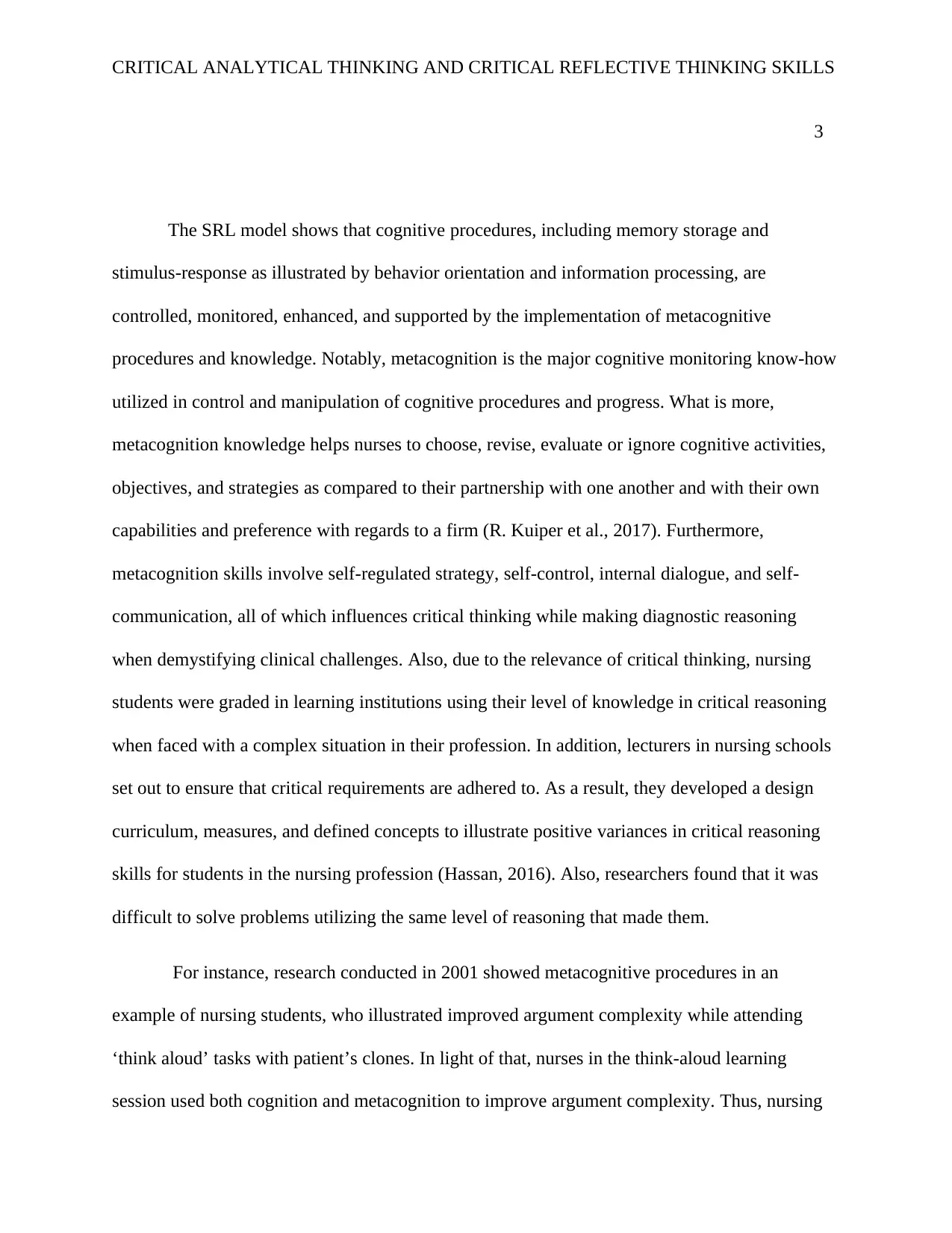
CRITICAL ANALYTICAL THINKING AND CRITICAL REFLECTIVE THINKING SKILLS
3
The SRL model shows that cognitive procedures, including memory storage and
stimulus-response as illustrated by behavior orientation and information processing, are
controlled, monitored, enhanced, and supported by the implementation of metacognitive
procedures and knowledge. Notably, metacognition is the major cognitive monitoring know-how
utilized in control and manipulation of cognitive procedures and progress. What is more,
metacognition knowledge helps nurses to choose, revise, evaluate or ignore cognitive activities,
objectives, and strategies as compared to their partnership with one another and with their own
capabilities and preference with regards to a firm (R. Kuiper et al., 2017). Furthermore,
metacognition skills involve self-regulated strategy, self-control, internal dialogue, and self-
communication, all of which influences critical thinking while making diagnostic reasoning
when demystifying clinical challenges. Also, due to the relevance of critical thinking, nursing
students were graded in learning institutions using their level of knowledge in critical reasoning
when faced with a complex situation in their profession. In addition, lecturers in nursing schools
set out to ensure that critical requirements are adhered to. As a result, they developed a design
curriculum, measures, and defined concepts to illustrate positive variances in critical reasoning
skills for students in the nursing profession (Hassan, 2016). Also, researchers found that it was
difficult to solve problems utilizing the same level of reasoning that made them.
For instance, research conducted in 2001 showed metacognitive procedures in an
example of nursing students, who illustrated improved argument complexity while attending
‘think aloud’ tasks with patient’s clones. In light of that, nurses in the think-aloud learning
session used both cognition and metacognition to improve argument complexity. Thus, nursing
3
The SRL model shows that cognitive procedures, including memory storage and
stimulus-response as illustrated by behavior orientation and information processing, are
controlled, monitored, enhanced, and supported by the implementation of metacognitive
procedures and knowledge. Notably, metacognition is the major cognitive monitoring know-how
utilized in control and manipulation of cognitive procedures and progress. What is more,
metacognition knowledge helps nurses to choose, revise, evaluate or ignore cognitive activities,
objectives, and strategies as compared to their partnership with one another and with their own
capabilities and preference with regards to a firm (R. Kuiper et al., 2017). Furthermore,
metacognition skills involve self-regulated strategy, self-control, internal dialogue, and self-
communication, all of which influences critical thinking while making diagnostic reasoning
when demystifying clinical challenges. Also, due to the relevance of critical thinking, nursing
students were graded in learning institutions using their level of knowledge in critical reasoning
when faced with a complex situation in their profession. In addition, lecturers in nursing schools
set out to ensure that critical requirements are adhered to. As a result, they developed a design
curriculum, measures, and defined concepts to illustrate positive variances in critical reasoning
skills for students in the nursing profession (Hassan, 2016). Also, researchers found that it was
difficult to solve problems utilizing the same level of reasoning that made them.
For instance, research conducted in 2001 showed metacognitive procedures in an
example of nursing students, who illustrated improved argument complexity while attending
‘think aloud’ tasks with patient’s clones. In light of that, nurses in the think-aloud learning
session used both cognition and metacognition to improve argument complexity. Thus, nursing
⊘ This is a preview!⊘
Do you want full access?
Subscribe today to unlock all pages.

Trusted by 1+ million students worldwide
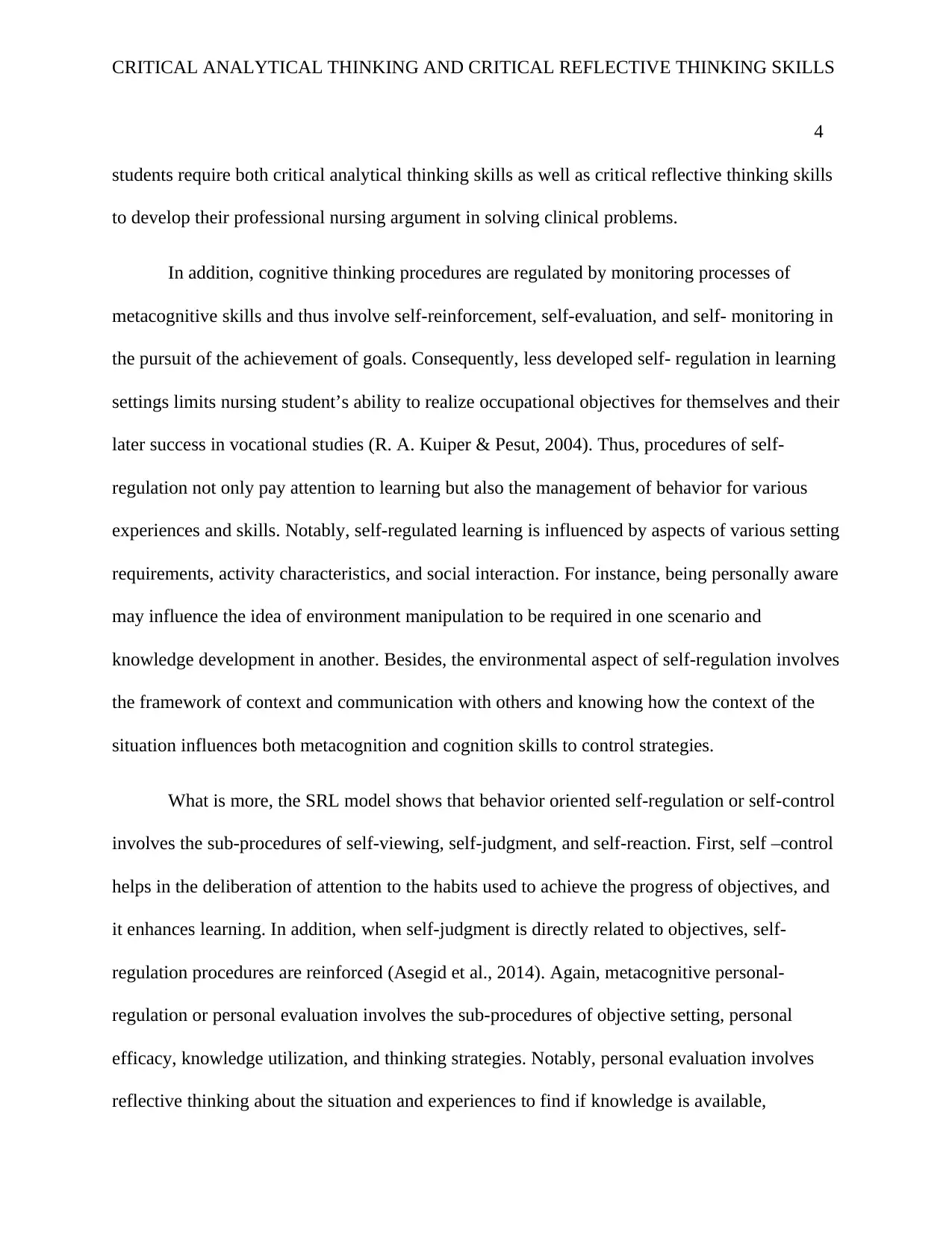
CRITICAL ANALYTICAL THINKING AND CRITICAL REFLECTIVE THINKING SKILLS
4
students require both critical analytical thinking skills as well as critical reflective thinking skills
to develop their professional nursing argument in solving clinical problems.
In addition, cognitive thinking procedures are regulated by monitoring processes of
metacognitive skills and thus involve self-reinforcement, self-evaluation, and self- monitoring in
the pursuit of the achievement of goals. Consequently, less developed self- regulation in learning
settings limits nursing student’s ability to realize occupational objectives for themselves and their
later success in vocational studies (R. A. Kuiper & Pesut, 2004). Thus, procedures of self-
regulation not only pay attention to learning but also the management of behavior for various
experiences and skills. Notably, self-regulated learning is influenced by aspects of various setting
requirements, activity characteristics, and social interaction. For instance, being personally aware
may influence the idea of environment manipulation to be required in one scenario and
knowledge development in another. Besides, the environmental aspect of self-regulation involves
the framework of context and communication with others and knowing how the context of the
situation influences both metacognition and cognition skills to control strategies.
What is more, the SRL model shows that behavior oriented self-regulation or self-control
involves the sub-procedures of self-viewing, self-judgment, and self-reaction. First, self –control
helps in the deliberation of attention to the habits used to achieve the progress of objectives, and
it enhances learning. In addition, when self-judgment is directly related to objectives, self-
regulation procedures are reinforced (Asegid et al., 2014). Again, metacognitive personal-
regulation or personal evaluation involves the sub-procedures of objective setting, personal
efficacy, knowledge utilization, and thinking strategies. Notably, personal evaluation involves
reflective thinking about the situation and experiences to find if knowledge is available,
4
students require both critical analytical thinking skills as well as critical reflective thinking skills
to develop their professional nursing argument in solving clinical problems.
In addition, cognitive thinking procedures are regulated by monitoring processes of
metacognitive skills and thus involve self-reinforcement, self-evaluation, and self- monitoring in
the pursuit of the achievement of goals. Consequently, less developed self- regulation in learning
settings limits nursing student’s ability to realize occupational objectives for themselves and their
later success in vocational studies (R. A. Kuiper & Pesut, 2004). Thus, procedures of self-
regulation not only pay attention to learning but also the management of behavior for various
experiences and skills. Notably, self-regulated learning is influenced by aspects of various setting
requirements, activity characteristics, and social interaction. For instance, being personally aware
may influence the idea of environment manipulation to be required in one scenario and
knowledge development in another. Besides, the environmental aspect of self-regulation involves
the framework of context and communication with others and knowing how the context of the
situation influences both metacognition and cognition skills to control strategies.
What is more, the SRL model shows that behavior oriented self-regulation or self-control
involves the sub-procedures of self-viewing, self-judgment, and self-reaction. First, self –control
helps in the deliberation of attention to the habits used to achieve the progress of objectives, and
it enhances learning. In addition, when self-judgment is directly related to objectives, self-
regulation procedures are reinforced (Asegid et al., 2014). Again, metacognitive personal-
regulation or personal evaluation involves the sub-procedures of objective setting, personal
efficacy, knowledge utilization, and thinking strategies. Notably, personal evaluation involves
reflective thinking about the situation and experiences to find if knowledge is available,
Paraphrase This Document
Need a fresh take? Get an instant paraphrase of this document with our AI Paraphraser
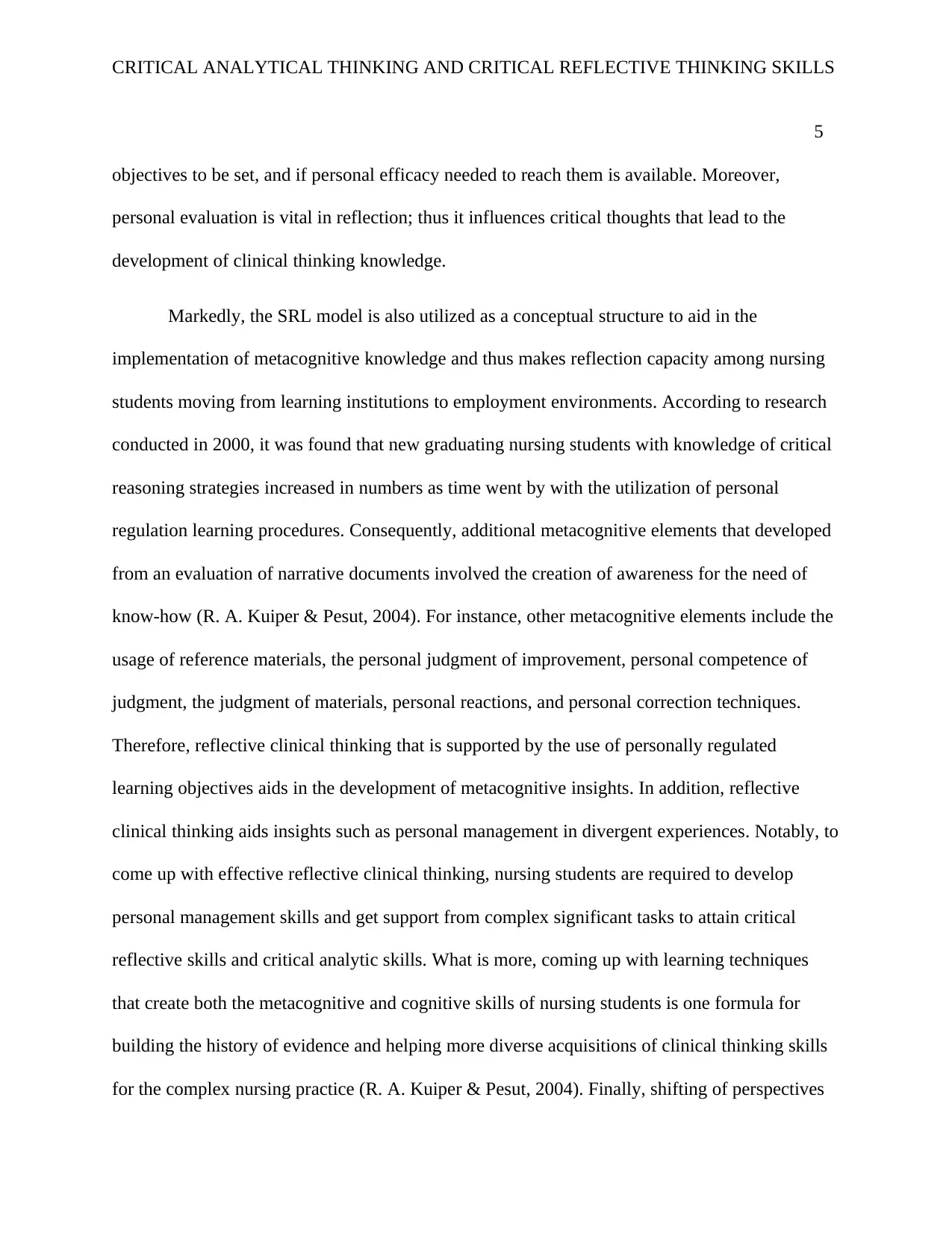
CRITICAL ANALYTICAL THINKING AND CRITICAL REFLECTIVE THINKING SKILLS
5
objectives to be set, and if personal efficacy needed to reach them is available. Moreover,
personal evaluation is vital in reflection; thus it influences critical thoughts that lead to the
development of clinical thinking knowledge.
Markedly, the SRL model is also utilized as a conceptual structure to aid in the
implementation of metacognitive knowledge and thus makes reflection capacity among nursing
students moving from learning institutions to employment environments. According to research
conducted in 2000, it was found that new graduating nursing students with knowledge of critical
reasoning strategies increased in numbers as time went by with the utilization of personal
regulation learning procedures. Consequently, additional metacognitive elements that developed
from an evaluation of narrative documents involved the creation of awareness for the need of
know-how (R. A. Kuiper & Pesut, 2004). For instance, other metacognitive elements include the
usage of reference materials, the personal judgment of improvement, personal competence of
judgment, the judgment of materials, personal reactions, and personal correction techniques.
Therefore, reflective clinical thinking that is supported by the use of personally regulated
learning objectives aids in the development of metacognitive insights. In addition, reflective
clinical thinking aids insights such as personal management in divergent experiences. Notably, to
come up with effective reflective clinical thinking, nursing students are required to develop
personal management skills and get support from complex significant tasks to attain critical
reflective skills and critical analytic skills. What is more, coming up with learning techniques
that create both the metacognitive and cognitive skills of nursing students is one formula for
building the history of evidence and helping more diverse acquisitions of clinical thinking skills
for the complex nursing practice (R. A. Kuiper & Pesut, 2004). Finally, shifting of perspectives
5
objectives to be set, and if personal efficacy needed to reach them is available. Moreover,
personal evaluation is vital in reflection; thus it influences critical thoughts that lead to the
development of clinical thinking knowledge.
Markedly, the SRL model is also utilized as a conceptual structure to aid in the
implementation of metacognitive knowledge and thus makes reflection capacity among nursing
students moving from learning institutions to employment environments. According to research
conducted in 2000, it was found that new graduating nursing students with knowledge of critical
reasoning strategies increased in numbers as time went by with the utilization of personal
regulation learning procedures. Consequently, additional metacognitive elements that developed
from an evaluation of narrative documents involved the creation of awareness for the need of
know-how (R. A. Kuiper & Pesut, 2004). For instance, other metacognitive elements include the
usage of reference materials, the personal judgment of improvement, personal competence of
judgment, the judgment of materials, personal reactions, and personal correction techniques.
Therefore, reflective clinical thinking that is supported by the use of personally regulated
learning objectives aids in the development of metacognitive insights. In addition, reflective
clinical thinking aids insights such as personal management in divergent experiences. Notably, to
come up with effective reflective clinical thinking, nursing students are required to develop
personal management skills and get support from complex significant tasks to attain critical
reflective skills and critical analytic skills. What is more, coming up with learning techniques
that create both the metacognitive and cognitive skills of nursing students is one formula for
building the history of evidence and helping more diverse acquisitions of clinical thinking skills
for the complex nursing practice (R. A. Kuiper & Pesut, 2004). Finally, shifting of perspectives
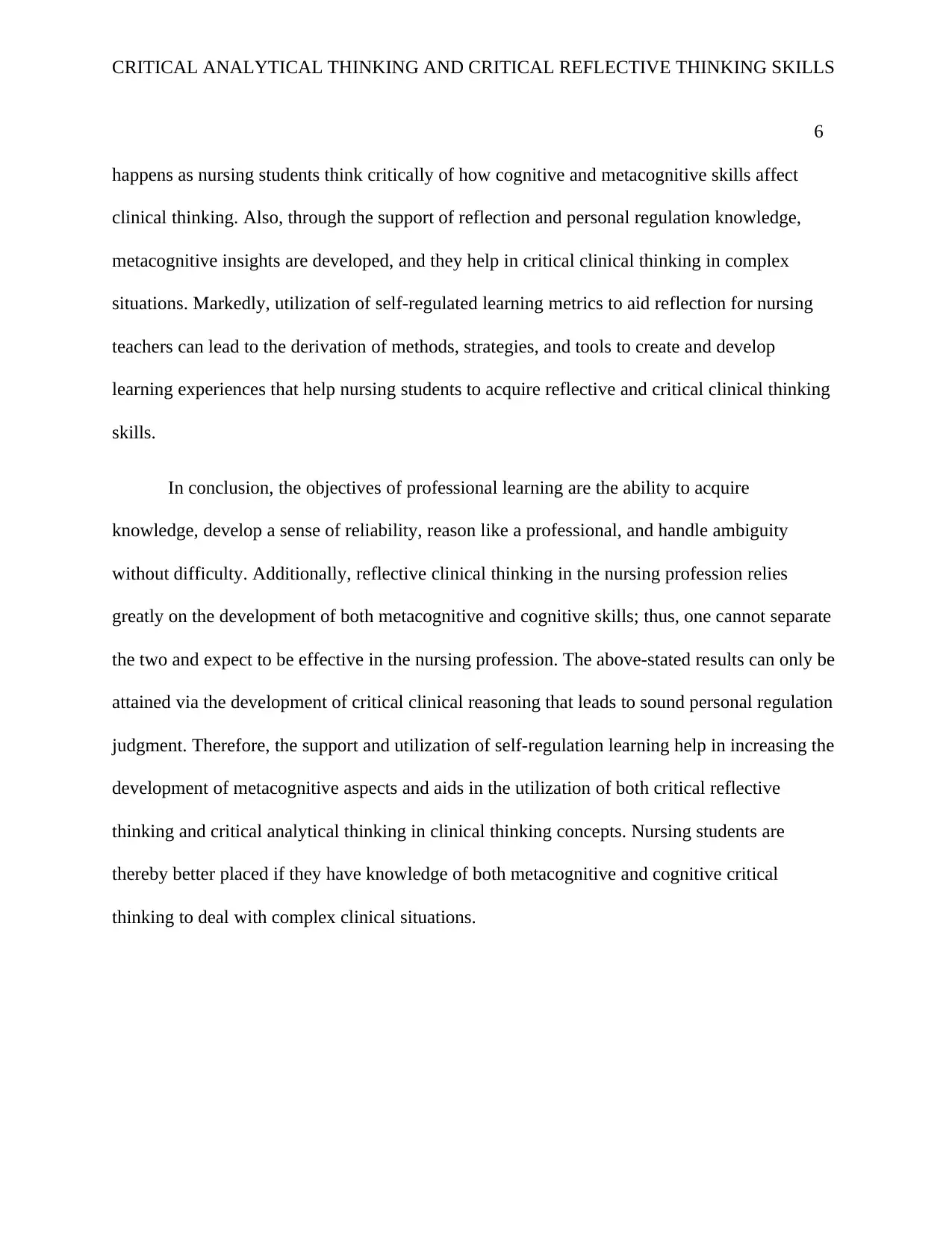
CRITICAL ANALYTICAL THINKING AND CRITICAL REFLECTIVE THINKING SKILLS
6
happens as nursing students think critically of how cognitive and metacognitive skills affect
clinical thinking. Also, through the support of reflection and personal regulation knowledge,
metacognitive insights are developed, and they help in critical clinical thinking in complex
situations. Markedly, utilization of self-regulated learning metrics to aid reflection for nursing
teachers can lead to the derivation of methods, strategies, and tools to create and develop
learning experiences that help nursing students to acquire reflective and critical clinical thinking
skills.
In conclusion, the objectives of professional learning are the ability to acquire
knowledge, develop a sense of reliability, reason like a professional, and handle ambiguity
without difficulty. Additionally, reflective clinical thinking in the nursing profession relies
greatly on the development of both metacognitive and cognitive skills; thus, one cannot separate
the two and expect to be effective in the nursing profession. The above-stated results can only be
attained via the development of critical clinical reasoning that leads to sound personal regulation
judgment. Therefore, the support and utilization of self-regulation learning help in increasing the
development of metacognitive aspects and aids in the utilization of both critical reflective
thinking and critical analytical thinking in clinical thinking concepts. Nursing students are
thereby better placed if they have knowledge of both metacognitive and cognitive critical
thinking to deal with complex clinical situations.
6
happens as nursing students think critically of how cognitive and metacognitive skills affect
clinical thinking. Also, through the support of reflection and personal regulation knowledge,
metacognitive insights are developed, and they help in critical clinical thinking in complex
situations. Markedly, utilization of self-regulated learning metrics to aid reflection for nursing
teachers can lead to the derivation of methods, strategies, and tools to create and develop
learning experiences that help nursing students to acquire reflective and critical clinical thinking
skills.
In conclusion, the objectives of professional learning are the ability to acquire
knowledge, develop a sense of reliability, reason like a professional, and handle ambiguity
without difficulty. Additionally, reflective clinical thinking in the nursing profession relies
greatly on the development of both metacognitive and cognitive skills; thus, one cannot separate
the two and expect to be effective in the nursing profession. The above-stated results can only be
attained via the development of critical clinical reasoning that leads to sound personal regulation
judgment. Therefore, the support and utilization of self-regulation learning help in increasing the
development of metacognitive aspects and aids in the utilization of both critical reflective
thinking and critical analytical thinking in clinical thinking concepts. Nursing students are
thereby better placed if they have knowledge of both metacognitive and cognitive critical
thinking to deal with complex clinical situations.
⊘ This is a preview!⊘
Do you want full access?
Subscribe today to unlock all pages.

Trusted by 1+ million students worldwide
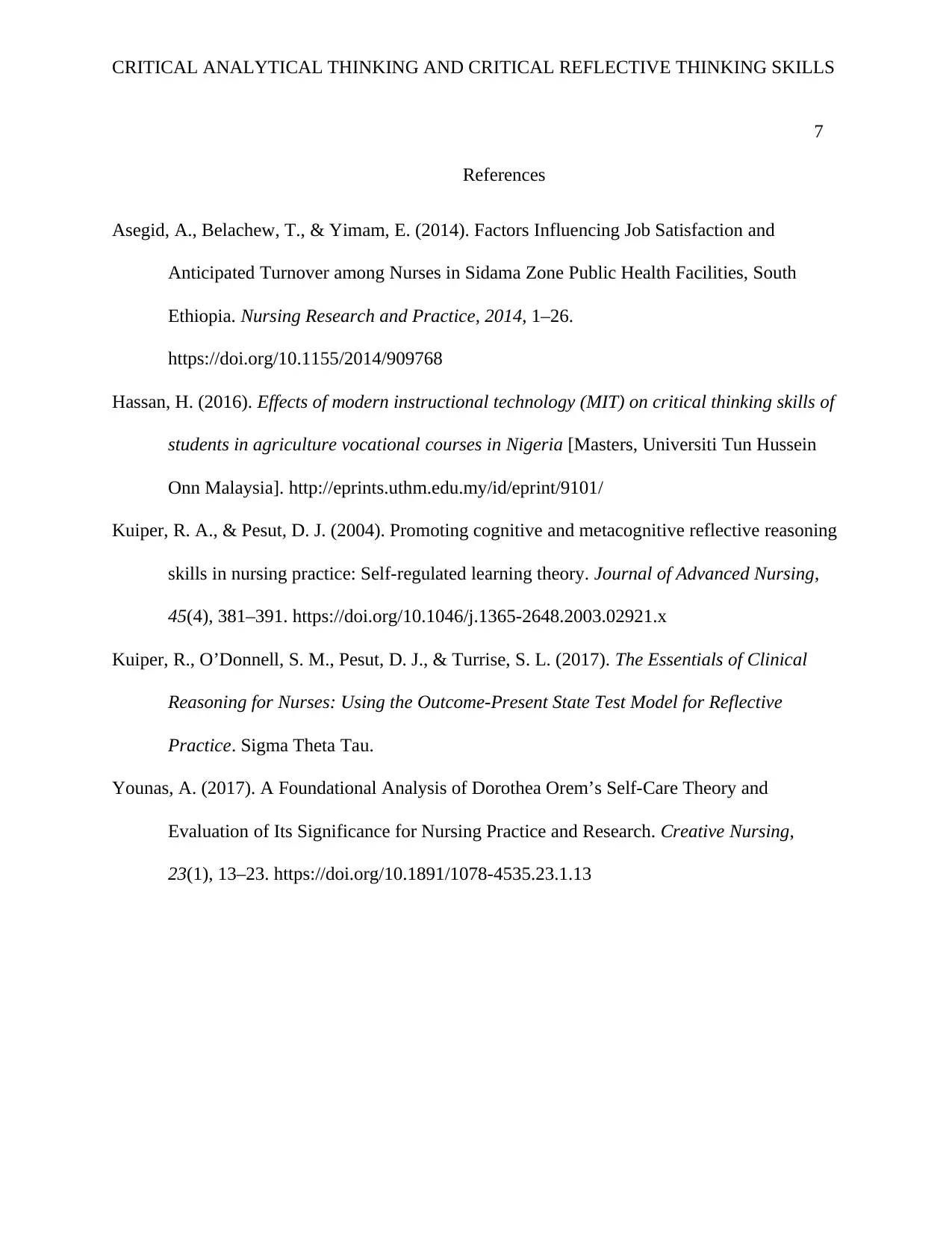
CRITICAL ANALYTICAL THINKING AND CRITICAL REFLECTIVE THINKING SKILLS
7
References
Asegid, A., Belachew, T., & Yimam, E. (2014). Factors Influencing Job Satisfaction and
Anticipated Turnover among Nurses in Sidama Zone Public Health Facilities, South
Ethiopia. Nursing Research and Practice, 2014, 1–26.
https://doi.org/10.1155/2014/909768
Hassan, H. (2016). Effects of modern instructional technology (MIT) on critical thinking skills of
students in agriculture vocational courses in Nigeria [Masters, Universiti Tun Hussein
Onn Malaysia]. http://eprints.uthm.edu.my/id/eprint/9101/
Kuiper, R. A., & Pesut, D. J. (2004). Promoting cognitive and metacognitive reflective reasoning
skills in nursing practice: Self-regulated learning theory. Journal of Advanced Nursing,
45(4), 381–391. https://doi.org/10.1046/j.1365-2648.2003.02921.x
Kuiper, R., O’Donnell, S. M., Pesut, D. J., & Turrise, S. L. (2017). The Essentials of Clinical
Reasoning for Nurses: Using the Outcome-Present State Test Model for Reflective
Practice. Sigma Theta Tau.
Younas, A. (2017). A Foundational Analysis of Dorothea Orem’s Self-Care Theory and
Evaluation of Its Significance for Nursing Practice and Research. Creative Nursing,
23(1), 13–23. https://doi.org/10.1891/1078-4535.23.1.13
7
References
Asegid, A., Belachew, T., & Yimam, E. (2014). Factors Influencing Job Satisfaction and
Anticipated Turnover among Nurses in Sidama Zone Public Health Facilities, South
Ethiopia. Nursing Research and Practice, 2014, 1–26.
https://doi.org/10.1155/2014/909768
Hassan, H. (2016). Effects of modern instructional technology (MIT) on critical thinking skills of
students in agriculture vocational courses in Nigeria [Masters, Universiti Tun Hussein
Onn Malaysia]. http://eprints.uthm.edu.my/id/eprint/9101/
Kuiper, R. A., & Pesut, D. J. (2004). Promoting cognitive and metacognitive reflective reasoning
skills in nursing practice: Self-regulated learning theory. Journal of Advanced Nursing,
45(4), 381–391. https://doi.org/10.1046/j.1365-2648.2003.02921.x
Kuiper, R., O’Donnell, S. M., Pesut, D. J., & Turrise, S. L. (2017). The Essentials of Clinical
Reasoning for Nurses: Using the Outcome-Present State Test Model for Reflective
Practice. Sigma Theta Tau.
Younas, A. (2017). A Foundational Analysis of Dorothea Orem’s Self-Care Theory and
Evaluation of Its Significance for Nursing Practice and Research. Creative Nursing,
23(1), 13–23. https://doi.org/10.1891/1078-4535.23.1.13
1 out of 7
Related Documents
Your All-in-One AI-Powered Toolkit for Academic Success.
+13062052269
info@desklib.com
Available 24*7 on WhatsApp / Email
![[object Object]](/_next/static/media/star-bottom.7253800d.svg)
Unlock your academic potential
Copyright © 2020–2025 A2Z Services. All Rights Reserved. Developed and managed by ZUCOL.





